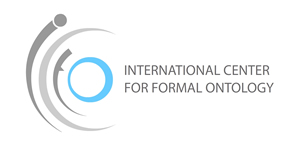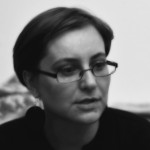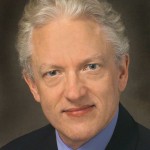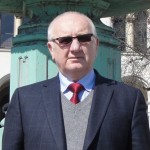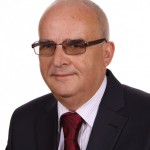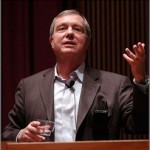Javier Belastegui is a PhD student in the University of the Basque Country, in Donostia-San Sebastian (Spain), where he finished his studies in Philosophy. He is currently working in a PhD thesis under the supervision of professor Thomas Mormann with a four year grant provided by the Basque Government. He has recently made a research stay at the Munich Center for Mathematical Philosophy in Munich. His thesis deals with the problem of natural kinds. The aim of the thesis is to develop a formal model for resemblance nominalism of kinds, which inevitably involves topological considerations. Besides kinds, he is interested into other topics in metaphysics such as essence, mereology and more generally anything related to formal metaphysics. He is a member of topological philosophy group at ICFO.
Tomasz Bigaj (PhD in philosophy in 1996, University of Warsaw) is an associate professor at the Institute of Philosophy, University of Warsaw, Poland, and a Marie Curie visiting fellow at the University of Bristol. He was a Marie Curie fellow at the University of California, San Diego, USA, and a visiting Fulbright fellow at the University of Michigan, Ann Arbor, USA. His recent research focuses on selected topics in the metaphysics of quantum mechanics, including the counterfactual analysis of quantum non-locality and causality, the dispositional interpretation of quantum properties, and the problem of identity and indiscernibility in philosophy and physics. Among his publications are: the book Non-locality and Possible Worlds. A Counterfactual Perspective on Quantum Entanglement (Ontos Verlag 2006), the edited volume (with Christian Wüthrich) Metaphysics in Contemporary Physics (Brill/Rodopi 2016), and over forty articles in Polish and international journals and collections of essays (including Journal of Philosophical Logic, Synthese, Erkenntnis, Ontology of Spacetime II, Studies in History and Philosophy of Modern Physics, Metaphysica, Philosophy of Science, Poznań Studies in the Philosophy of the Sciences and the Humanities, and Foundations of Science). Bigaj’s recent publications can be found here: https://uw.academia.edu/TomaszBigaj .
Director of the Institute of Philosophy at the Polish Academy of Sciences, Warsaw. He was a member of the ICFO Program Council for the term 2015-2020.
Michał Głowala is an assistant professor at the Institute of Philosophy, University of Wrocław. His research concerns mainly scholastic metaphysics (especially the metaphysics of powers and the metaphysics of action in late scholasticism) in the context of contemporary analytical metaphysics (in particular the metaphysics of powers). His recent publications include Singleness. Self-Individuation and Its Rejection in the Scholastic Debate on Principles of Individuation (forthcoming in de Gruyter), Power Individuation: A New Version of the Single-Tracking View („Metaphysica” 16 (2015), issue 2), Unity and Plurality in Joint Manifestations of Powers: A Scholastic Approach („Revista Portuguesa de Filosofia” 71 (2015), issue 4), How do Powers Tend toward Their Manifestations? Three Thomistic Theories of the Prevention of Powers (in Analytically Oriented Thomism, ed. M. Szatkowski (2016)).
Joanna Golińska-Pilarek is an assistant professor at the Institute of Philosophy, University of Warsaw. Her research interests are focused on logic and its applications, in particular in philosophy, mathematics, cognitive and computer sciences, among others. Recently, she works on logics for qualitative reasoning and their (relational) dual tableaux, non-Fregean logics with identity and equimeaning connectives. She published in leading international journals (Annals of Pure and Applied Logic, Logic Journal of IGPL, Fuzzy Sets and Systems, Studia Logica, Mathematical Logic Quarterly, Journal of Philosophical Logic, Notre Dame Journal of Formal Logic). She has also co-authored a comprehensive survey monograph Dual Tableaux: Foundations, Methodology, Case Studies published in Springer (2011). She was conducting a large project on logics for qualitative reasoning funded by the Polish National Science Centre within program MAESTRO (see www.logicsforqr.uw.edu.pl). In the ICFO Council (term 2015-2020) she represented the Faculty of Philosophy and Sociology of the University of Warsaw. Homepage: www.joannagolinska.com.
Rafał Gruszczyński is an associate professor at the Department of Logic at the Nicolaus Copernicus University in Toruń (Poland). In his scientific work, he focuses mainly on region-based theories of spaces, with a special emphasis on point-free geometry and point-free topology. He is an editor-in-chief of a quarterly Logic and Logical Philosophy and the supervisor of NCU Logical Society, an organization whose aim is to promote advanced topics in logic among students and young researchers. He is a member of topological philosophy research group at the ICFO.
Janusz Kaczmarek is a professor at the University of Łódź and an employee of the Department of Logic and Methodology of Sciences at the University of Łódź. In 1995 he defended his doctoral thesis on the Pragmatic and logical concept of a proposition. In 2009 he defended his second dissertation (the so-called habilitation) based on the monograph Indywidua. Ideas. Concepts. Research in the field of formalised ontology. Currently he deals with the problems of formal logic, philosophy of language and semiotics, but focuses mainly on the study of ontological problems and selected issues of philosophical anthropology. Ontological problems are most often explored by him in a formal way, i.e. with the use of logic, algebraic structures and recently also general topology tools. His main goal is now to create a new method of studying ontological problems (metaphysical), which is called topological ontology. The results of this work can be found, among others, in the papers: (2019), Ontology in Tractatus Logico-Philosophicus. A Topological Approach, (2019), On the Topological Modelling of Ontological Objects: Substance in the Monadology and in earlier papers in Przegląd Filozoficzny, Bulletin of the Section of Logic and others. For data on selected publications, see, for example, the website:
https://ktfp.academia.edu/JanuszKaczmarek. He is a member of the steering committee of the topological philosophy research group at ICFO.
Christian Kanzian is a professor of philosophy at the University of Innsbruck, Austria. His research concerns analytical philosophy, especially analytical ontology, history of philosophy (Kant). The list of his monographies includes: Grundproblerne der Analytischen Ontologie (with E. Runggaldier, 1998), Ereignisse und andere Partikularien (2001), Ding – Substanz – Person. Eine Alltagsontologie (2009). 2016 will appear his Wie Dinge sind. Editions (selection): Substance and Attribute (together with Legenhausen 2007), Persistence (2008), How Things Are (together with Loffler, Quitterer 2011). Kanzian has published more than seventy articles, mainly to ontological topics. He is a President of the Austrian Wittgenstein Society. Homepage: http://www.uibk.ac.at/philtheol/kanzian/person/index.html.en.
Roman M. Krzanowski teaches philosophy at the Pontifical University of John Paul II in Krakow. He also is a visiting professor at the Silesian University of Technology in Gliwice where he lectures on computer networking. He has published books in the areas of information science and telecommunication technology. His philosophical interests include the philosophy of information and informatics, the ontology and metaphysics of nature, ethics, and the ethical problems emerging in an information-based society. He has published papers on robotic ethics, phronesis in robotics, and the ethical testing of autonomous robots.
Wiesław Kubiś, a researcher in the Institute of Mathematics, Czech Academy of Sciences, is a mathematician working mainly in applications of logic. In the last years, his research focuses on developing the theory of generic objects within the framework of category theory. The results have already found numerous, sometimes unexpected, applications in several areas of mathematics, including geometric topology, Banach space theory, and C*-algebra. One of his plans is exploring philosophical aspects of the theory of generic objects. Among his most important works so far is the preprint Metric-enriched categories and approximate Fraïssé limits, [http://arxiv.org/abs/1210.6506], containing the general theory of generic objects in metric-enriched categories. This work is still under development, yet it already received several significant citations. He is a member of Topological Philosophy research group at ICFO.
Andoni Ibarra is the director of the Miguel Sánchez-Mazas Chair at the University of the Basque Country (UPV/EHU). A graduate of the Autonomous University of Barcelona, he received his PhD in philosophy from the UPV/EHU. He has been the director of the International Graduate and PhD Programs in Philosophy (UPV/EHU, UNAM of Mexico and the University Carlos III, Madrid). Initially his main research interest were in philosophy of science (semantics and pragmatics of scientific representations) and history of the philosophy of science. He edited some books in those areas (with T. Mormann: Structures in Mathematical Theories, De Gruyter, 1992, Representations of Scientific Rationality. Contemporary Formal Philosophy of Science in Spain, Rodopi, 1997) and authored others (Representaciones en la ciencia, 1997, with T. Mormann). In more recent years his interests have also been focused on assessment and policy of science and technology. He is the editor-in-chief of Theoria. An International Journal for Theory, History and Foundations of Science. Homepage: https://www.ehu.eus/es/web/miguelsanchezmazaskatedra/ praxis/people/members/ibarra.
Nasim Mahoozi is currently a PhD student in cognitive science and language at the university of Barcelona. Since 2016 she works on her thesis at university of Basque country, UPV/EHU. Her doctoral research investigates the application of topology on vagueness. She holds a master’s degree in philosophy of science from the Sharif University, Tehran, Iran. Also, she has completed a master in cognitive science and language as a LOGOS member from the University of Barcelona. She obtained her BA in mathematics from the Tehran University, Iran. Among other fields, she is mainly interested in topology, category theory, their philosophical applications and subsequently, turning philosopher’s attention to the importance of topological approaches. Also, she is interested in vagueness, philosophy of mind, conceptual spaces, cognitive science, mereology and artificial intelligence. You can find the joint manuscript paper of her and Thomas Mormann, titled: “Some higher-order Vagueness in Williamson’s ‘logic of clarity”. She is a member of topological philosophy group at ICFO.
Thomas Mormann is Professor of Philosophy at the University of the Basque Country in Donostia-San Sebastian, Spain. He obtained his PhD in Mathematics from the University of Dortmund (1978). He obtained his Habilitation from the University of Munich. He works in the philosophy of science, formal ontology, structuralism, Carnap studies, and neo-Kantianism. He is one of the world leaders in topological philosophy. He is the author of many recognized articles in this field. Some of his works can be found here: https://facultyofphilosophyande.academia.edu/ThomasMormann. His last article on the subject was published in Erkentnist: Topological Models of Columnar Vagueness. Thomas Mormann is the author of a tutorial on topological philosophy. He is a member of the steering committee of the topological philosophy research group at ICFO.
Imanol Mozo Carollo is an Assistant Professor at the Department of Applied Economics I at the University of the Basque Country UPV/EHU. He obtained his Phd in Mathematics in 2015 from the UPV/EHU and has worked as a postdoctoral fellow at the Center of Excellence in Computation, Algebra and Topology (CECAT) at Chapman University. In his research, he has focused on pointfree topology, an abstract region-based approach to topology that replaces spaces by an abstraction of their lattices of open sets and takes as object of study the category of locales and its dual, the category of frames. He is a member of Topological Philosophy research group at the ICFO.
Witold Marciszewski. Born 1930. Ph.D. 1959. Habilitation 1970 with dissertation on the logical theory of beliefs. Professor 1979. LECTURED mainly at the University of Warsaw. Visiting Professor: Halle 1974; Salzburg University, 1987. ESTABLISHED: in 1975 – university department of Logic and Informatics; 1980 – the quarterly “Studies in Logic, Grammar and Rhetoric“; 2011 – academic blog “Cafe Aleph” to discuss logical and ontological aspects of computer science. Co-edited and co-authored with Paweł Stacewicz. Published by a Foundation (promoting studies in computer science) in collaboration with the Warsaw University of Technology. SUPERVISED: in 1986-1990 the Polish national project “Logical Systems and Algorithms for Automated Proof-Checking”. MAIN PUBLICATIONS: “Dictionary of Logic: Concepts, Methods, Theories” (editor, author of the half of size), Nijhoff 1981. “Categorial Grammar” (co-edtitor and co-author), Benjamins 1988. “Logic from a Rhetorical Point of View“, de Gruyter 1994 (reprint 2012). “Mechanization of Reasoning in a Historical Perspective” (co-author R.Murawski), Rodopi 1995. His studies in FORMAL ONTOLOGY concern mainly the ontology of Leibniz: lectures in Salzburg, papers delivered at Leibniz Congresses, publications in “Studies…” etc. He was a member of the ICFO Program Council (term 2015-2020).
Uwe Meixner is a professor of philosophy at the University of Augsburg, Germany. He previously was bound up with the University of Regensburg (till 2010) and earned his doctorate from that university in 1986, under the direction of Franz von Kutschera. His main fields of research are theoretical philosophy (especially, logic, metaphysics, and philosophy of mind) and the history of philosophy. Uwe Meixner is the author of twelve books: Handlung, Zeit, Notwendigkeit: Eine ontologisch-semantische Untersuchung (1987), Ereignis und Substanz: Die Metaphysik von Realität und Realisation (1997), Axiomatic Formal Ontology (1997), Theorie der Kausalität: Ein Leitfaden zum Kausalbegriff in zwei Teilen (2001), The Two Sides of Being: A Reassessment of Psycho-Physical Dualism (2004), Einfuhrung in die Ontologie (2004), David Lewis (2006), The Theory of Ontic Modalitie (2006), Modalität: Möglichkeit, Notwendigkeit, Essenzialismus (2008), Philosophische Anfangsgründe der Quantenphysik (2009), Modelling Metaphysics: The Metaphysics of a Model (2010), Defending Husserl. A Plea in the Case of Wittgenstein & Company vs. Phenomenology (2014). He has published over 100 articles, and is a co-editor of two journals: Logical Analysis and History of Philosophy and Metaphysica. He was a member of the ICFO Program Council (term 2015-2020).
Giuseppe Primiero is Associate Professor of Logic at the Department of Philosophy, University of Milan (Italy). He acts as President of the DHST Commission for the History and Philosophy of Computing (HaPoC) and Secretary General of the Association Computability in Europe (CiE). His research interests are primarily in Logic and Computation, Philosophy of Computing and Information. He is a member of the Philosophy of Computing research group at the ICFO. More info: https://sites.unimi.it/gprimiero/.
Paweł Polak – professor of philosophy at Pontifical University of John Paul II in Cracow, studied telecommunication at Cracow University of Technology (AGH) and philosophy at Pontifical Academy of Theology. Editor-in-chief of periodical ‘Philosophical Problems in Science (Zagadnienia Filozoficzne w Nauce)”, member of Commission on the History of Science of the Polish Academy of Arts and Sciences, secretary of the Commission on the Philosophy of Science (the same Academy); published in „Studies in Logic, Grammar and Rhetoric”, „Foundations of Computing and Decision Sciences”, „Studia Historiae Scientiarum”, „Studia Metodologiczne”. He published books about philosophical aspects of scientometrics and about philosophical reception of Special and General Relativity in Lwów. His interests in philosophy of science include the history and philosophy of computing/informatics, pancomputationalism, history of Polish philosophy, he is also interested in applied philosophy (machine ethics and wine philosophy). He is a member of the Philosophy of Computing research group at the ICFO.
Grzegorz Sitek is an assistant professor at the Department of Philosophy, Jan Długosz University in Częstochowa. He received a master’s degree in philosophy on the basis of a thesis devoted to the comparison of systems of point-free topology and geometry. He also obtained his bachelor’s degree in astronomy. He received a PhD degree (specialization: logic and formal ontology) on the basis of a thesis on metaarithmetic constructions based on the Tarski’s system of point-free geometry. In his research he is interested in the problem of constructing mathematical concepts (arithmetic and geometric) within the theories based on mereology, in particular, mereological variants of point-free theories of space. He is also interested in the problem of the degree of the level of abstraction of mathematical concepts and on possibile ways to reduce it based on systems of point-free geometry and topology. He is a member of topological philosophy research group at the ICFO.
Barry Smith is SUNY Distinguished Professor in theDepartment of Philosophy in the University at Buffalo, with joint appointments in the Departments of Biomedical Informatics, Computer Science and Engineering, and Neurology. He also serves as Director of the National Center for Ontological Research.
Smith’s research has been funded by the National Institutes of Health, the US, Swiss and Austrian National Science Foundations, the Volkswagen Foundation, the European Union, and the US Department of Defense. His work on the science of ontology led to the establishment of Basic Formal Ontology (BFO) as the most commonly adopted upper-level ontology development framework. It also led to the formation of the OBO (Open Biomedical Ontologies) Foundry, a suite of interoperable ontology modules designed to support information-driven research in biology and biomedicine. The methodology underlying BFO and the OBO Foundry is now being applied in a range of different domains, including defense logistics, military intelligence, sustainable development, and industrial engineering. He was a member of the first ICFO Program Council.
Mirosław Szatkowski was a professor of philosophy at the Warsaw University of Technology, Poland. He was also associated with the Department of Philosophy, Theory of Science and Religious Studies at the Ludwig-Maximilians University in Munich, Germany. His fields of research are Logic, Foundations of Mathematics, and Formal Ontology (especially, ontological proofs for the existence of God). The following three papers give a good expression of his interests: [1]. ‘‘Semantic Analysis of some Variants of Anderson-like Ontological Proofs’’, in Studia Logica, 79(2005), pp. 317-355. [2]. ‘‘How to think about the correctness of theistic belief’’, in Metaphysica, 15(2014), pp. 47–68. [3]. ‘‘God’s Omniscience and Logical Virtue’’, in God, Truth, and other Enigmas, edited by M. Szatkowski, Walter de Gruyter, 2015, 99-116. He served as the first Director of the ICFO.
Kazimierz Trzęsicki is a professor of philosophy at the Faculty of History and Sociology, University of Białystok, Poland. His main fields of research are Logic, History and Philosophy of Science and Information Technology. He was a member of the first ICFO Program Council.
Peter van Inwagen is a John Cardinal O’Hara Professor of Philosophy at the Department of Philosophy, University of Notre Dame. He is the author of eight books: Existence: Essays in Ontology (2014), The Problem of Evil (2006), Ontology, Identity, and Modality: Essays in Metaphysics (2002),
The Possibility of Resurrection and Other Essays in Christian Apologetics (1998), God, Knowledge and Mystery: Essays in Philosophical Theology (1995), Metaphysics (1993), Material Beings (1990), An Essay on Free Will (1983). He was the president of the Society of Christian Philosophers from 2010 to 2013. Most of Professor van Inwagen’s work is available at: http://andrewmbailey.com/pvi/. He was a member of the first ICFO Program Council.
Krzysztof Wójtowicz is a Professor of Philosophy at the Institute of Philosophy at the Warsaw University. His main scientific interests focus on philosophy of mathematics – in particular on: (1) the realism-antirealism debate; (2) the problem of mathematical (in particular: topological) explanations in science; (3) non-standard models of computation (like quantum computing) and hypercomputation – and their possible impact on philosophy of mathematics. Apart from philosophy of mathematics, he is also interested in the probabilistic description of conditionals in natural language. Some of the latest papers: (1) „Theory of quantum computation and philosophy of mathematics (II)”. Logic and Logical Philosophy, 29 (1), 2019, 173-193. (2) „Are there category-theoretical explanations of physical phenomena?”, in: M. Kuś and B. Skowron (eds.), Category Theory in Physics, Mathematics, and Philosophy, Springer Proceedings in Physics 235, 33-43. (3) „Why categories?”, with: Kuś M., Skowron B, in: M. Kuś and B. Skowron (eds.), Category Theory in Physics, Mathematics, and Philosophy. (4) A stochastic graphs semantics for conditionals (with Anna Wójtowicz) Erkenntnis (2019). (5) “”Does mathematical possibility imply existence?, Contemporary Polish Ontology, B.Skowron (ed.), de Gruyter 2019, 161-180. One can find some of his papers at https://www.researchgate.net/profile/Krzysztof_Wojtowicz2. Krzysztof Wójtowicz was a member of the ICFO Program Council and is a member of Topological Philosophy Research Group (TPG) at ICFO.
